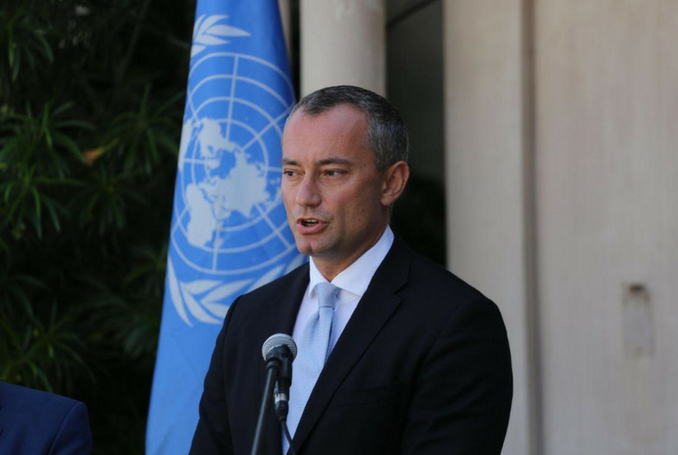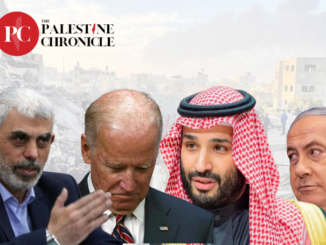
The United Nations has warned of a new political crisis and conflict between Israel and the Palestinians if Israel continues with its plan to annex parts of the occupied West Bank.
The UN gave the warning in a newly published paper yesterday, in which it said that while cooperation between Israel and Palestine to battle the coronavirus pandemic is commendable and welcome, a new and revived conflict will be underway if current trends between the two continue.
It stressed that if Israel proceeds with its annexation plans and the Palestinian Authority (PA) withdraws from bilateral agreements, the work that has been achieved over the past 25 years will be undermined, security will collapse and both sides will witness further extremist politics.
UN peace coordinator Nikolai Mladenov: The constant threat that Israel will annex parts of the West Bank is a serious violation of international law. pic.twitter.com/GSVrO8J8BY
— Shehab News Agency (@ShehabAgencyEn) May 20, 2020
Nickolay Mladenov, the United Nations Special Coordinator for the Middle East Peace Process whose office issued the paper, stated:
“All sides must do their part in the coming weeks and months in order to preserve the prospect of a negotiated two-state resolution to the conflict, in line with relevant UN resolutions, international law and bilateral agreements.”
The paper emphasizes that the matter is especially important in light of the global spread of COVID-19, which the UN has been helping Palestinians tackle. It stresses that much more support is needed in the occupied Palestinian territories, however, as the health systems in the area would be unable to cope with a further surge in cases, particularly in the besieged Gaza Strip.
‘Annexed’ #Palestinians Will Not Be Granted #Israeli #Citizenship, #Netanyahu Announces https://t.co/O8JZs8YNND via @PalestineChron pic.twitter.com/k9e4rcbMzv
— @palestinechron (@PalestineChron) June 1, 2020
The paper was written and released in time for the bi-annual meeting of the Ad Hoc Liaison Committee (AHLC), which coordinates the delivery of international aid to Palestinians and the Palestinian Authority, and is to take place tomorrow.
The UN stated that it is “deeply committed to working with Israelis and Palestinians and with our international and regional partners to realize the objective of a lasting and just peace,” which it says “can only be achieved through two states, Israel and Palestine, living side-by-side in peace and security.”
It insisted that “Walking away from this framework undermines the ability of the international [community] to provide this support. An Israeli annexation of parts of the West Bank would also call into the question the purpose of the AHLC and the engagement of its members in support of Palestinian institution-building.” It added that it is ready to continue to “ensure the Israeli-Palestinian conflict does not escalate further or get pulled into the latest regional escalation.”
The #PA’s Pro-#EU Diplomacy Merely Serves Its Self-preservation https://t.co/K45KadRk7D via @PalestineChron pic.twitter.com/MwHmrLt9XR
— @palestinechron (@PalestineChron) June 1, 2020
Israel’s annexation plans, which are backed by the US and rejected by the Palestinians, have drawn international opposition.
Aside from most of the EU’s push to dissuade Israel from annexing parts of the West Bank, Turkey has previously stated it will “not allow” Israel to move forward with its plans.
Jordan, which has signed a peace treaty with Israel, warned of a “massive conflict” and said it would review its relationship with Israel if annexation plans move ahead.
The #Oslo Accords were meant to be relevant up to a point, until 1999, when the final status negotiations were meant to be held as the last step before the establishment of an independent #Palestinian State. https://t.co/ogAaeSbcRL via @PalestineChron #Palestine
— @palestinechron (@PalestineChron) May 30, 2020
On May 24, Israeli Prime Minister Benjamin Netanyahu renewed his pledge to annex part of the occupied Palestinian West Bank in July.
Palestinians have expressed outrage, appealing to the international community to block the Israeli step, which, if implemented, would be considered the final nail in the two-state solution’s coffin.
Palestinian Authority President Mahmoud Abbas announced on May 19 that the PA is canceling all agreements with Israel and the US, as a direct response to Israel’s annexation plans.
(Palestine Chronicle, MEMO, Social Media)







